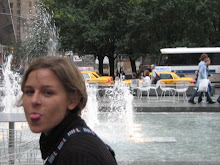This past weekend Sara, Coeurlida and I took a four-hour taxi ride (minibuses with 14 people plus the driver stuffed into them) to Mbale in eastern Uganda near the Kenyan border. From there we got a private taxi, aka “special hire”, for the 45 minute drive north to Sipi falls, which are reportedly the most beautiful waterfalls in Uganda. The road wound through gently rolling countryside with rural villages, then sharply began to gain elevation into formerly volcanic mountains. As we rounded a bend, we were met suddenly by a large crowd of ululating people who were waving leaves and cloth in the air, running down the mountain. Puzzled, I asked the taxi driver what was going on. He said they were celebrating a circumcision ceremony, which is a tradition the Bagisu people perform for males between the ages of 15-26, but typically at age 15-16. It is a coming-of-age ceremony marking the transition to manhood and is performed publicly, in front of men and women. The boy being circumcised cannot cry out in pain or he will be branded a coward.
We arrived at the place we were going to stay – Crow’s Nest – and were greeted warmly by the staff. It is a simple establishment with tiny cabins nestled into the side of the mountain that cost $15/night. They are equipped with a bed, mosquito net and pit toilet. There is normally electricity via a generator, but we were informed that it was broken (fortunately I had my headlamp!). Yet whatever was lacking in amenities was made up for by the breathtaking view from our porch of the largest waterfall, the surrounding basin and savannah that stretches out for miles. It was truly stunning. After relaxing for a while, enjoying the vista, we decided to take a walk before dinner to see the sunset.
Meandering down a dirt road we met a teenage boy named Isaac with whom we struck up a conversation. He offered to show us his nearby village. As we walked through we were greeted by small children throwing toy parachutes into the air and an old woman came out of her house to greet us. As we were speaking to her another woman named Nancy came by and with impeccable English asked if we would come see her house a short distance away. We arrived to the rectangular abode with a wooden frame plastered in mud to form the walls. She opened her doors and invited us to sit on the couch in her living room - probably the most prized possession of the household. "You are welcome," she declared, with a huge grin on her round cheery face. As she left the room to find a candle (there was no electricity) we found out that the group of children peering through the door were hers and 'adopted children' she cared for. In fact, our guide Isaac was an orphan whom she had taken under her wing. "I call her mother," he said. When Nancy returned with an oil lamp we chatted for a while about the small business she and her husband owned in town, as well as the livestock she was raising, before she said, "Okay, let's make dinner!", with the full intention of including all of us in her evening meal. Though overwhelmed by her hospitality, we politely declined both because we had already made dinner reservations at our hotel and because we did not want to consume her meager resources with so many other hungry bellies to feed.
Almost every time I meet someone new in Uganda, greetings and introductions are followed with ‘You are welcome.’ It is not the ‘you are welcome’ that Americans say after a ‘thank you’ but means ‘ you are welcome to this place’ and on a larger level, ‘you are welcome to Uganda.’
If only we could all be so welcoming and gracious to newcomers. Most of the time the generosity of Ugandans puts me to shame.
(Coeurlida is the chief resident of the primary care internal medicine program at Yale and arrived a week and a half ago).
Subscribe to:
Post Comments (Atom)


No comments:
Post a Comment